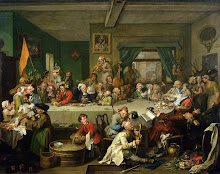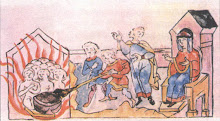It all started so amicably. In early April, Poe, in his role as drama critic for the "Broadway Journal," wrote to William Dinneford, the manager of New York's Palmo's Opera House, asking for the usual free admission granted to journalists. Poe indicated that he wished to see Dinneford's upcoming production of Sophocles' "Antigone," and was anxious to do it "Justice."

Poe's subsequent review of the play was utterly withering. In the April 12 issue of the "Journal," he wrote: "The idea of reproducing a Greek play before a modern audience is the idea of a pedant and nothing beyond...Many persons will be curious to understand the mode in which the Greeks wrote dramas and performed them--but, alas! no person should go to Palmo's for such understanding." He added, "We are really ashamed of wasting so much space in commenting on such a piece of folly."
Dinneford was not pleased. On April 15, he sent Poe an indignant letter focusing on his outrage that Poe had been able to savage his play gratis.
"SIR!" he spat, "In your note of the 2d inst. you request of me the favor of being placed on the free list of this theatre, because (as your letter says) you were anxious 'to do Justice to Antigone on its representation.' Your name was accordingly placed on the free list. Your Critique has appeared, in the Broadway Journal, characterized, much more by ill nature and an illiberal spirit, than by fair and candid, or even just criticism.
In justice therefore to MYSELF, I have withdrawn your name from the free list. I am always prepared to submit; as a catererer [sic] for public amusement, to any just remarks, though they may be severe, but I do not feel MYSELF called upon to offer facilities to any one, to do me injury by animadversions evidently marked by ill feeling. I am SIR!
With very great respect,
Your most obt servt W. DINNEFORD.
To Edgar Poe, Esq., &c. &c. &c., Author of THE RAVEN.
New York, Apl. 15, 1845. No. 8 Astor House"
Poe's response was no surprise to anyone who knows anything about Poe. The April 19 “Journal” carried the headline “Achilles' Wrath.” Below it, Poe commented, "At 'No. 8 Astor House,' in a style (no doubt) of luxurious elegance and ease, resides a gentleman and a scholar, who (without paying his postage) has forwarded us a note, (through the Despatch Post,) signing it either Mr. W. Dinneford, or Mr. P. or Mr. Q. Dinneford--for he writes a shockingly bad hand, and we are unable to make out all his capitals with precision. It is not always the best scribe, however, physically considered, who is capable of inditing the most agreeable note--as the note of Mr. Dinneford will show. Here it is."
Poe then reproduced Dinneford's letter. He went on to say, "We are not wrong (are we?) in conceiving that Mr. Dinneford is in a passion. We are not accustomed to compositions of precisely this character--(that is to say, notes written in large capitals with admiration notes for commas--the whole varied occasionally with lower case)--but still, we think ourselves justified in imagining that Mr. Dinneford was in a passion when he sent us this note from his suite of boudoirs at the Astor House. In fact, we fancy that we can trace the gradations of his wrath in the number and impressiveness of his underscoring. The SIRS!! for example, are exceedingly bitter, and in THE RAVEN, which has five black lines beneath it, each one blacker than the preceding, we can only consider ourselves as devoted to the Infernal Gods."
"Mr. Dinneford is in a passion then--but what about? We had been given to understand, that it was usual in New York, among editors newly established, to apply (by note) for the customary free admission to the theatres. The custom is a wretched one, we grant, but since it was a custom, we were weak enough, in this instance, to be guided by it. We made our note to this Dinneford as brief and as explicit as possible--for we felt that the task was a dirty one. We stated distinctly that we wished to be placed on his free list for the purpose of 'doing justice to Antigone'--just as he says himself. To this note the inhabitant of No. 8 Astor House condescended to make no reply. Supposing that the man 'knew no better,' and pitying his ignorance from the bottom of our hearts, we proceeded to the theatre on its opening night, in the full certainty of at least finding our name on the free list. It was not there. And the blatherskite who could behave in so indecent a manner, as to fail first in answering our note, and secondly in paying attention to the request it contained, has the audacity to find fault with us because we dared to express an unbiased opinion of his stupidity--that is to say, of the stupidity of a play gotten up by himself, Mr. Dinneford."
"...We are not wasting words on this Quinneford[sic]--it is the public to whom we speak--to the editorial corps in especial. We wish to call their attention to the peculiar character of the conditions which managers such as this have the impudence to avow, as attached to the privilege of the free list. No puff no privilege, is the contract. That is to say, an editor, when admitted to the theatre, is to be understood as leaving his conscience in the street. He is admitted not to judge--not to criticise--but to adulate..."
"We have spoken, altogether, of 'such managers' as Quinneford--but fortunately such managers are few. There is certainly not in New York, at the present moment, any other member of the theatrical profession, who either would have behaved with the gross discourtesy of this gentleman, or who, in inditing the preposterous letter published above, could have proved himself, personally, so successful a 'caterer for the public amusement.'"
Poe dismissed the hapless manager with, "We told him that we meant to do him justice--and we did it."
Episodes such as this make me wish longingly that Poe was around today to write a blog. What he'd do with trolls would be a perfect joy to behold.
(P.S. Poe's fellow critics and New York audiences all agreed with his opinion of Dinneford's "Antigone." The play closed after barely two weeks.)
Images via Wikipedia, NYPL.















